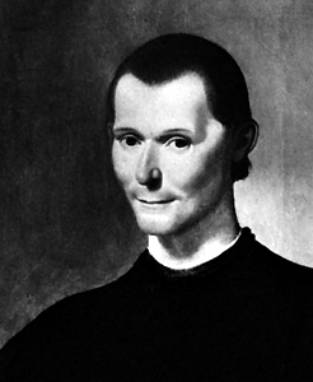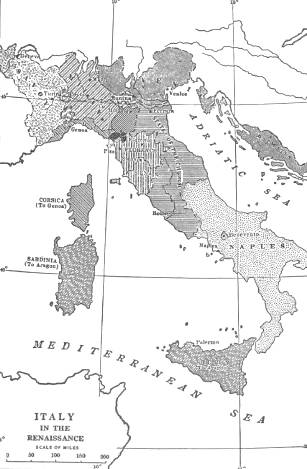|
|
|
|
|
|
|
|
|
|
|
|
|

Machiavelli was a great political philosopher who
lived in Italy during the height of the Renaissance. He lived his life
searching for the real answers behind politics in the hopes that one-day
Italy might be united to achieve its former glory as a world power. Today,
Machiavelli is widely known for the controversial political views found
in his masterpiece, The Prince.
After the Black Death swept across Europe during the fourteenth
century, the general attitudes of the people began to change. The Catholic
Church had been powerless to stop the onslaught and chaos brought by the
plague. This caused people to seek answers elsewhere, beyond the dogma
of the church. Scholars looked towards the ancients of Greece and Rome
as models for their inquiries into the human world. Individualism, secularism,
and humanism replaced grace and divinity. By the time Machiavelli was born
in Florence in 1469, Italy was experiencing a Renaissance, a rebirth of
classical literature and ways of thinking.
The Italy of Machiavelliís time was in a state of
political confusion. Foreign armies clashed on Italian battlefields in
hopes of conquest. Powerful Italian families battled for control of the
countryside. City-states and territories dotted the Italian landscape.
Alliances were forged and broken. The papacy was becoming increasingly
corrupted, and foreign mercenaries were being hired to fight for the Italian
cause. Italy lacked the general political stability and unity that scholars
were finding had existed before the Catholic Church during the time of
the Romans.
Machiavelli
officially began his political career in 1498, at the age of twenty-nine.
That year, Machiavelli was given the position of Chancellor and Secretary
of the Ten of Liberty and Peace in the Republic of Florence. Machiavelliís
job in the Florentine Republic allowed him to travel abroad on diplomatic
missions and see how other successful governments functioned. He met with
many famous leaders such as Luis XII of France, Cesare Borgia (son of Pope
Alexander VI), Pope Julius II, and Emperor Maximilian I of the Holy Roman
Empire. His travels made him realize that both political power and stability
were possible if the right formulas were followed.
In 1512, the
Medici family took over Florence and the republic was dissolved. Machiavelli
was removed from office and, after he was suspected in an anti-Medici plot,
he was imprisoned and tortured. Machiavelli was released from prison in
1513 and decided to retire to his countryside home of San Casciano. It
was there that Machiavelli composed his most famous works, The Prince
(1513), and The Discourses (1513-19). In the lush countryside of
San Casciano, Machiavelli also wrote the, Art of War (1521), and
the History of Florence (1525).
When the Medici
presence in Florence was overthrown, Machiavelli hoped to regain his position
in the republic. He returned from his exile to Florence in 1527. Machiavelli,
however, was not that popular in Florence. Some people suspected him of
being pro-Medici; others feared him because of his deep political insights.
At 58 years old, Machiavelliís health was beginning to deteriorate. He
grew sick and died in 1527, never fully achieving the political power he
desired.
Machiavelliís
works, however, leave him a legacy far greater than any political title
could have given him. His views on politics set him apart from any other
political philosopher before him. Following true Renaissance style, Machiavelli
looked to the past to supply answers for the present and future. Machiavelli
engrossed himself in classical literature and in the study of ancient leaders.
He compared ancient leaders and ancient situations to the leaders and the
events of his own time. Machiavelli wanted to know the method to achieve
political success, and how this method could be used to unite Italy.
Machiavelli
believed in a cyclical view of history, that situations in the present
are mimetic of past situations. With this in mind, all the answers to current
problems could be found in the past. By exposing the mimetic aspects of
history, Machiavelli was able to find historyís didactic nature. History
was instructional, one could learn from the past to obtain the answers
he was looking for.
Machiavelli
also probed deep into the conflict between politics and ethics. Politics,
matters of state, were always of the utmost importance. To Machiavelli,
the state was the primary good. The state provided security and freedom
for its citizens; therefore everything must be done in order to maintain
it. This belief placed political leaders above ethical standards. In the
words of Machiavelli, ďthe ends justify the means.Ē Leaders must do everything
they can to support the state, even if their actions at times seem unethical.
By placing
the state as the primary good, Machiavelli was able to examine corruption.
Corruption of the state occurred when a leader placed some secondary good
(material wealth/status) above the primary good (the state). So long as
the state remains the primary good, the government will be powerful and
the people will be secure.
Machiavelli,
like the ancient Romans, recognized that republican forms of government
could be too slow to act during times of necessity. For this reason, Machiavelli
saw no fault in the temporary leadership of a prince or a dictator during
times of crisis. As long as the state always remains the primary good,
the government will be just. Also, a dictator or prince must never have
the power to change the traditional laws governing the leadership of the
state. In such a case, individuals can place their own ambitions (secondary
good) above the state (primary good) and corruption develops. Machiavelli
favored republics like his own Venice, but recognized that under certain
conditions or times of crisis, rule must be passed to one individual for
drastic action. The ability of an absolute ruler to obtain fast action
led to Machiavelliís quest for a great Prince. A great Prince, he believed,
could act fast to rid Italy of its foreign occupation and unite the Italian
people. Once the Prince had restored and reunited Italy, steps could be
taken to redevelop the republic and Italy would be great again. Machiavelli
also believed that a strong state must have a strong military. A strong
military, made up of citizen soldiers, works to continuously enforce the
powers of the state, and thus upholds the primary good. Citizens should
be freed from their obligations to the church because the church suppressed
arête
(valor, courage, and the honor of a warrior) and preached humility and
meekness. In this light, Machiavelli believed in strong secularism. According
to Machiavelli, citizens should place nothing (not even God) above the
state. The state and the state alone existed to provide citizens with security.
Machiavelliís works have given birth to a new political era. Many of
the ideas and methods developed by Machiavelli and other Renaissance philosophers
are still in practice today. Machiavelliís call for secularism is still
reflected in modern governments through separation of church and state.
His approach towards treating the problems of mankind as a science is still
mirrored by todayís social scientists. The method of solving current problems
by comparing them to past situations is still used by contemporary historians,
politicians, and economists. Ideas and methods first developed by Machiavelli
have stood the test of time to prove that Machiavelli was truly a great
philosopher.
Bondanella, Peter and Mark Musa. The Portable Machiavelli.
New York: Viking Penguin Inc., 1979.
Butterfield, H. The Statecraft of Machiavelli.
London: G. Bell and Sons Ltd., 1979.
Machiavelli, Niccolo. The Art of War.
Machiavelli, Niccolo. The Discourses.
Machiavelli, Niccolo. The History of Florence.
Machiavelli, Niccolo. The Prince.
Sullivan, Vickie B. Machiavelliís Three Romes.
DeKalb: Northern Illinois University Press, 1996.
http://www.sas.upenn.edu/~pgrose/mach/
-Huge list of Machiavelli links. On
his travels, and in his quest into ancient literature,
On
his travels, and in his quest into ancient literature,
Barricelli, Jean-Pierre. Machiavelliís The Prince: Text and Commentary.
Woodbury: Baronís Educational Series, 1975.
http://www.ctbw.com/lubman.htm
-Nice summary of Machiavelliís life with a black and white picture of Machiavelli.
http://www.utm.edu/research/iep/m/machiave.htm
-Short article about Machiavelli with an analysis of key points in The
Prince.
http://radicalacademy.com/philmachiavelli.htm#Machiavelli
-Analysis of Machiavelliís life and political beliefs.
http://www2.lucidcafe.com/lucidcafe/library/96may/machiavelli.html
-Brief article on Machiavelli with links to other related philosophers.
Site created by: Al Sabin